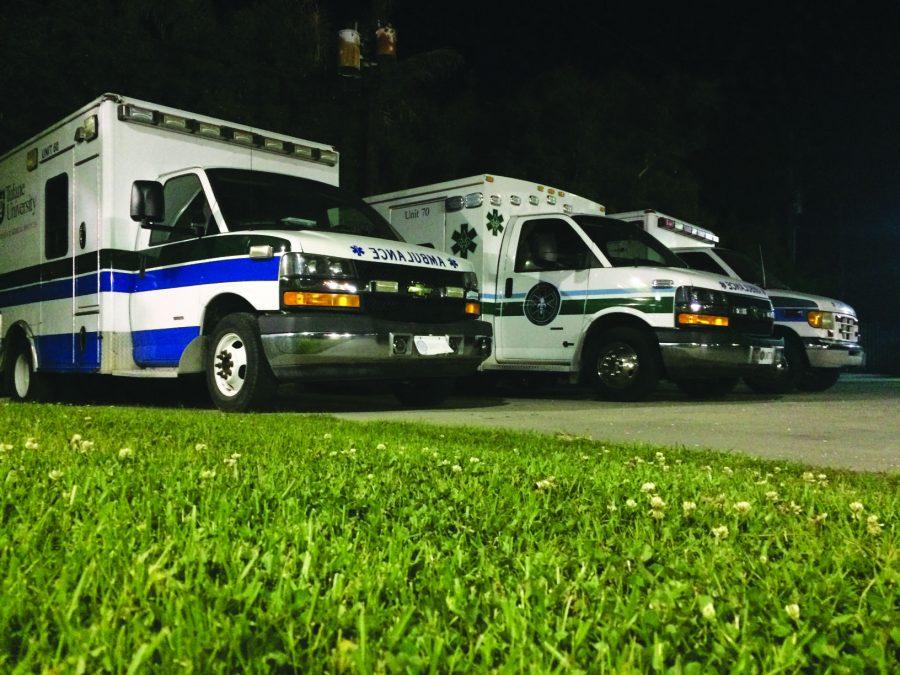Staff, students anticipate TEMS’ return to campus
Tulane Emergency Medical Services (TEMS) is set to make a comeback to Tulane’s campus in the near future, although the administration has not released a concrete date.
April 6, 2016
The supporters of the #BringBackTEMS campaign are slowly but surely getting their wish: While the date remains unconfirmed, Tulane Emergency Medical Services closes in on a return.
After being suspended for hazing and failure to comply with university policy, a number of discussions happened throughout the year to rethink the image and infrastructure of TEMS. Faculty remain optimistic about TEMS’ return and anticipate a large influx of volunteers eager to gain experience in emergency medicine and contribute to the greater movement towards increased health at Tulane.
“What we have focused on with [Assistant Vice President of Campus Health] Dr. [Scott] Tims and [Medical Director of Campus Health Services] Dr. [Daniel] Garrett is trying to build the capacity of TEMS to be able to provide the services that they have historically provided, but to do so in a sustainable way that meets university expectations,” Tulane Vice President for Student Affairs Dusty Porter said.
Tims explained that involved parties met to discuss what needed to happen before TEMS returned, and they gradually compiled a checklist of sorts, including revamped training, recruiting and advising.
“We had about seven items on that list, everything from training to oversight, some marketing and communications, and some issues with the city,” Tims said. “We’re sort of on that last part [with the city] right now … but it’s always been ‘when,’ not ‘if.'”
One of the final roadblocks for TEMS’ return is the renewal of an ordinance with the city of New Orleans. The mayor must sign an agreement that states the city’s acknowledgment of TEMS as an emergency response service.
In waiting for the mayor’s signature, contemplations still abound as to what TEMS will look like upon its restitution.
“I’m interested to see how [TEMS] can expand their services, like including mental health services,” junior Phoebe Coughlin said. “I hope to see them interacting more with people on campus instead of operating in their own little bubble. We’ll see how it comes back.”
A new selection committee formed for recruiting TEMS members for the fall. As of now, about 20 new members have joined. Porter anticipates that incoming TEMS volunteers will be attracted to the opportunity to serve the community.
“I would hope that we continue to attract great students because it’s service,” Porter said. “Tulane is about service. TEMS is about service. … You’re volunteering your time to give back to your Tulane community in ways that hopefully are mutually beneficial. You’re helping people.”
One change in organizational mentality is that, while still a student organization, TEMS operates under a medical license and is entrusted with the health of Tulane students.
“Given the scrutiny and given the medical license and given the expectations, you need to be a student-led enterprise under the auspices of campus health,” Porter said.
Porter said a “stronger connection” would exist between TEMS and the Department of Campus Health going forth, and knows that students will benefit.
“I hope TEMS can, in their delivery of services, [be] seen by the student population as an entity of health and well-being on campus,” Porter said.
With TEMS as an essential feature of campus health, some students felt a gap in the reassurance TEMS’ presence has provided to them.
The lack of emergency services on campus was controversial because some students saw it as a deflection of TEMS’ punishment onto the students.
“I understand why TEMS was penalized, but I don’t think it’s fair that Tulane students should suffer a lack of emergency medical services on campus because of certain members’ mistakes,” junior Marissa Bramwell said.
Coughlin studied abroad in the fall semester, and returned to campus feeling confused about new policies concerning medical emergencies and accountability.
“I just like seeing them around campus,” Coughlin said. “It makes me feel safe [that] if there are ever any problems … you don’t have to call 911. … It’s nice to know that they’re there to act in that situation.”










Leave a Comment